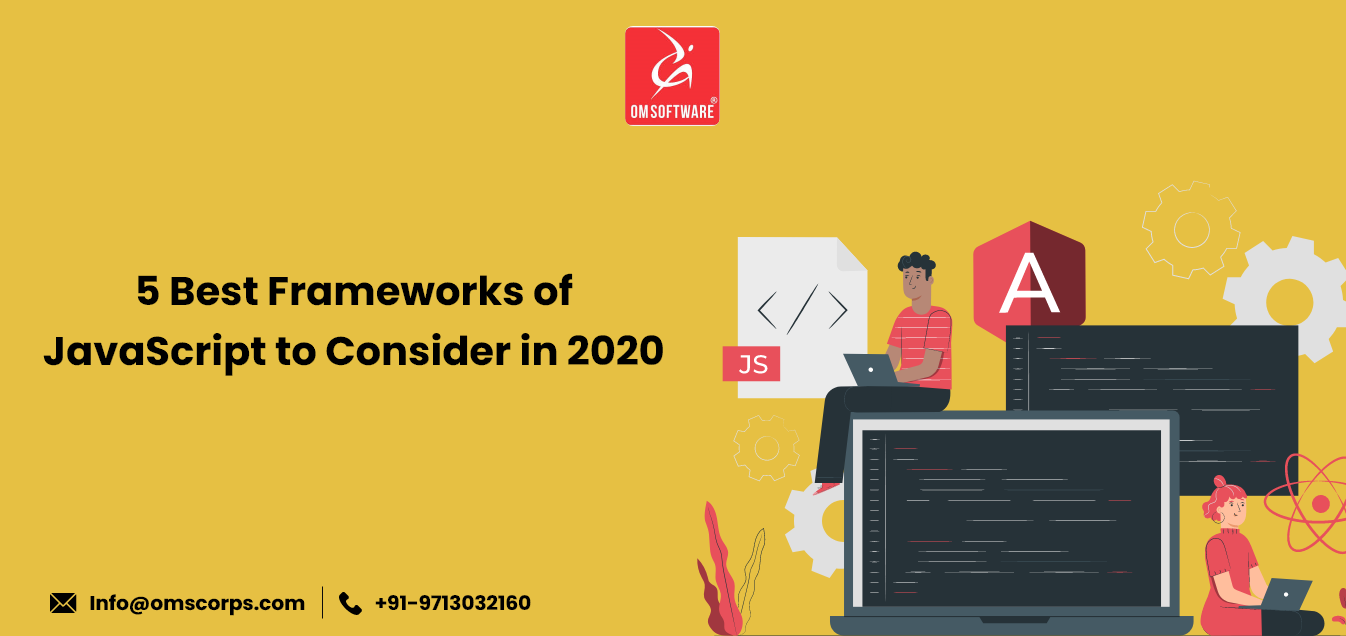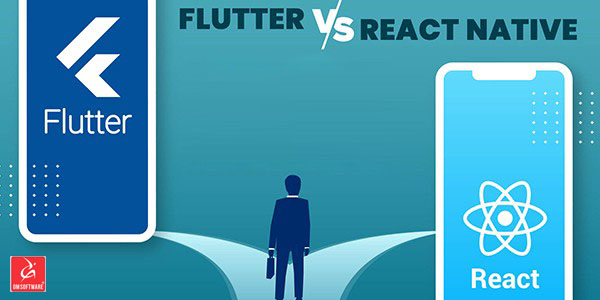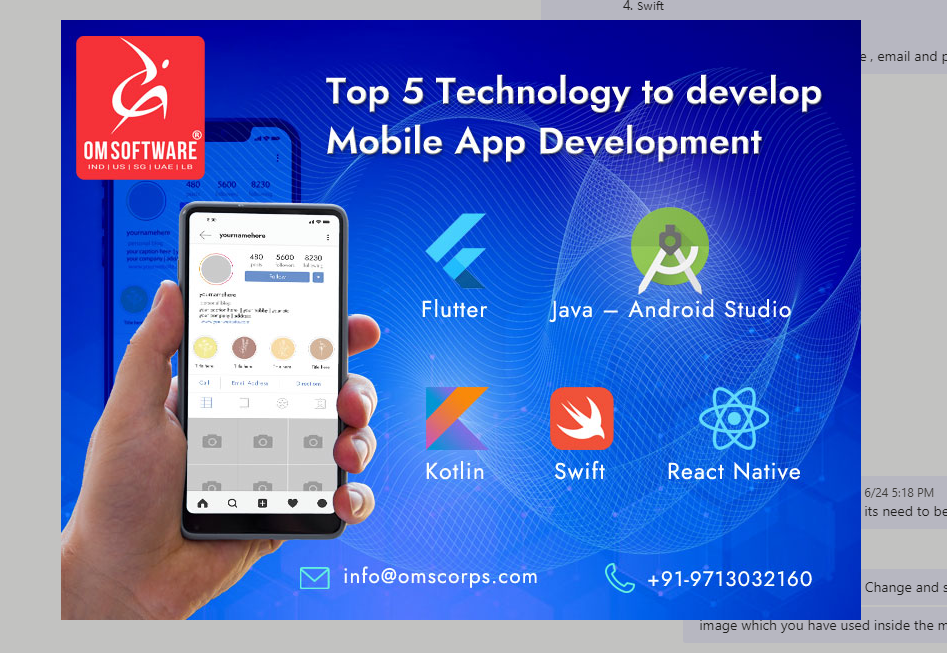30
2020
october

Name : Raj Kamal
Contact No. : +91 +919713030021
E-Mail : Raj@omscorps.com
CEO , OMSOFTWARE
Social Media

HTML and CSS are the most popular ones to manage the data and design of the web. Honestly, JavaScript has become one of the best platforms for maintaining functionality. JavaScript is the most useful for web apps and web pages. These are some of the most important things to consider and manage properly. It would help if you got in touch with a web developer who will use a high-quality framework.
Some of the prominent frameworks in 2020 include the following
1. React
React by Facebook is undoubtedly one of the best platforms. This declarative framework is highly responsive and can help to create high-quality web apps and websites. React allows you to write readable codes that are easy to debug.
It follows a DOM object to maintain a statistical update. Owing to the component logic in JavaScript, React can be pretty helpful. Unlike other frameworks, React is component-based and can help to extend it across the main codebase.
One of the most arguable aspects is if React is a library or framework. Despite the argument, one cannot deny the popularity of the framework. Furthermore, React has a lot of tools, too, which is why it can also be considered a library. However, it will be tough for beginners to learn to React because of the wide range of tools. Once you learn how to operate React, you will be able to go with the flow.
2. Angular
React can often be overwhelming, but Angular is a prominent JavaScript framework that can work across different tools. Angular is one of the best parts of the MEAN stack used along with MongoDB database, Express.js, and Node.js.
While React is by Facebook, Angular by Google has a strong cache that can play an important role in enhancing performance. Angular is completely component-based and allows reusable coding with prominent third-party integrations. It is coded from your database.
Angular is extremely documented adequately along with GitHub and also through the library. The only disadvantage of Angular is that it is dependent on Typescript, which only increases the learning curve. Moreover, Angular is also of a high-size, so it may not be suitable for small applications.
3. Svelte.js
Although it is new, many expert developers believe that it can throw major shade on React as a 'de-facto' JavaScript framework and for all good reasons.
Like other frameworks, Svelte.js is also component-based and small. Like Angular, it is also written in Typescript, but it doesn't use Typescript completely. Unlike React, it does not follow virtual ROM and is a small size, component-based architecture. As a result, Svelte.js is one of the best and fastest frameworks. With high performance, Svelte becomes one of the best frameworks, which is why it is worth it.
Since it is new, Svelte.js has a small community and comes with a limited user-based. There are no or very fewer jobs for Svelte because of the lack of interaction with third-party components and the skill to learn it. But, if you want to learn JavaScript easily and have a smooth experience, Svelte.js is undoubtedly one of the best frameworks to choose from.
4. Ember
Let's just say; Ember is one of those JavaScript frameworks that are rich in all features. It contains all the essential features. Being a component-based platform, Ember follows HTML and CSS. Furthermore, it is a single-page application that is very scalable. As a result, Ember can be easily installed and managed. Unlike the other platforms, it provides a lot of free templates that can be controlled using npm.
All prominent applications such as Apple, LinkedIn, Heroku, Netflix, Square, and Microsoft function using Ember. One of the best features of Ember is that it is updated every six weeks. Furthermore, it is an extremely stable framework. Unlike other platforms, Ember has its personal conference, dedicated podcasts, and Discord community, making it easy to learn Ember.
However, it has strong works, which is why customization with this framework is often difficult. It is prevalent, and thus, there's a wide range of users.
5. Vue.js
Often Angular may not work the best for building small applications. Hence, it is Vue.js that takes up the entire job. Vue.js is highly inspired by Angular and has a very lightweight framework, which is why it is extremely efficient and versatile. With just 20KB, it can handle single-page applications perfectly.
It also has the same features as that of React, working with virtual DOM. It makes it pretty easy to access all the changes. However, unlike React, Vue.js is pretty easy to use and can work the best in MVC architecture. Vue.js is easy to learn, and it is based on an easy HTML template. As a result, you won't have to proceed with complex coding.
Vue.js is also a component-based framework that is well-documented and can follow with CSS, JS, and HTML code. As a result, it helps to maintain and make the implementation module pretty easy. The only drawback of Vue.js is that it follows a small community and has fewer requirements. Angular and React has high-popularity. So, Vue.js is not as much in demand as other frameworks as a skill for the job.
There are several frameworks available in the market. Whether you are looking for a prominent front-end JavaScript development, you can find it perfect. The frameworks are highly functional and require extreme experience. No matter what kind of framework you're looking for, you can find it all with these frameworks.
The expert developers have hand-picked some of the best JavaScript frameworks. It is 2020, and thus, it is time that you find the best framework for developing either a website or a web application. Make sure to check the framework thoroughly so that you can find the best.
Related Blog

The mobile app development industry is constantly evolving and things have changed a lot. With smartphones becoming one of the most important parts of our life, the technology too has become an undeni

As time moves ahead towards more technological advancements, a new app is launched in the market. Several reports over the years have shown the positive impact of these apps on the market

A proper content marketing strategy is the key to taking your business to great heights. But, do you know that most of the businesses in today's time do not have a proper strategy? The content market

Every business should work towards having a logo for their business that can help to boost the impression. It has the power to uphold your brand's perception. Om Software can help you develop a log

Educational apps have come a long way and it's for the good. If we take a look, every student in today's time is glued to their smartphones. The coming in of smartphones and mobile apps have eased o

AI-based marketing is beneficial, but it has its own cons too. There are several reasons why you may want to include this in your business. But, there are also reasons why you should be careful with i

A lot of websites put their phone numbers or email addresses, thinking their customers to contact them. Apart from that, several websites also put their HTML mail to links. But is it that easy? No. No

It's 2020, and apps are the things that have played an essential role in enhancing the overall quality of life. Needless to say, these apps have had a huge impact on our life. Gone are the days when

JavaScript has played an essential role in transforming the digital world. No wonder, ever since this framework came into the market, things have turned upside down. Well, there's no reason to consid

No customer experience is obtained in a day. A better customer experience is a result of in-depth planning and delivery. However, there is a minimal approach to customer experiences. The businesses, o

The concept of "free" has always been fascinating and a little tempting. People tend to run behind free things. Quoting it from John Green's The Fault in Our Stars, "The World is not a wish-granti

Fintech apps have revolutionised how customers interact with financial institutions. With the rapidly moving time, customers have high expectations from Fintech apps such as fast, visual appeal and us

A logo is not only your brand's symbol but an entire representation. Without a logo, a brand loses its authority and is nothing. Every business should work towards having a logo for their business

Launching an app without knowing the market is like jumping into a lake of fire. It's extremely dangerous and risky. You surely wouldn't want to risk the shot, since you've already invested a lot.

Do you know what a successful business is? When you are getting regular sales from a group of loyal customers

The pandemic-induced school closures put 1.2 billion children out of the classroom globally. This made institutes to use stopgap arrangements such as virtual-led teaching for the continuity of educati

"Blogspot.in domains are not working. Reasons and Reactions"

Mobile app development has always been one of the most important things to consider. The digital world has contributed a lot to transform the businesses. With moving times, it has become necessary for

Here at OMSOFTWARE PVT LTD, we’re committed to providing development solutions for your business! We work with businesses of all sizes and primarily focus on small business clients. So today we want

Startups have become an ongoing thing in today's generation. The emergence of tech startups has taken over the world. The entire credit should be handed down to the privileges that today's youth are

The sudden outbreak of COVID-19 proved to be a threat and a problem. It led to massive disruptions in the work schedule, but we are ensured that we provide excellent services to our clients even from

E-Commerce is ever growing with the increasing popularity of Internet. In recent few years, several people made their way into providing some kind of e-Commerce based services or products. It helped t

Trying to seek expert help in Ecommerce Website design and development can be a tricky task to undertake. Who do you trust? How do you choose the right content management system developer? What type o

Today is Independence Day in USA, the day of several celebrations, the day of fun and laughter, the day of fireworks, the day of global importance, and above all the day of dignity for all US Citizens

An idea is always considered ridiculous till it proves itself a phenomenon. Same can be said for e-commerce that met with huge criticism in its early days, is it safe or not? Is it viable or not? With

OM Software Internet Solutions Pvt. Ltd. (OMS) is helping out small and medium enterprises (SME's) to achieve their business goals by integrating technology into all their core business functions. OM

Information Technology (IT) has transformed the way businesses used to function in past. Nobody imagined during initial days of Internet evolution that one day, it will override every functioning of a

Web hosting is an essential need for every business (no matter eBusiness or any offline business). Websites and web applications are a part of modern life. Therefore, in order to have their own websit

Today on eve of Thanksgiving I'm offering my heartiest congratulations to you (on beha